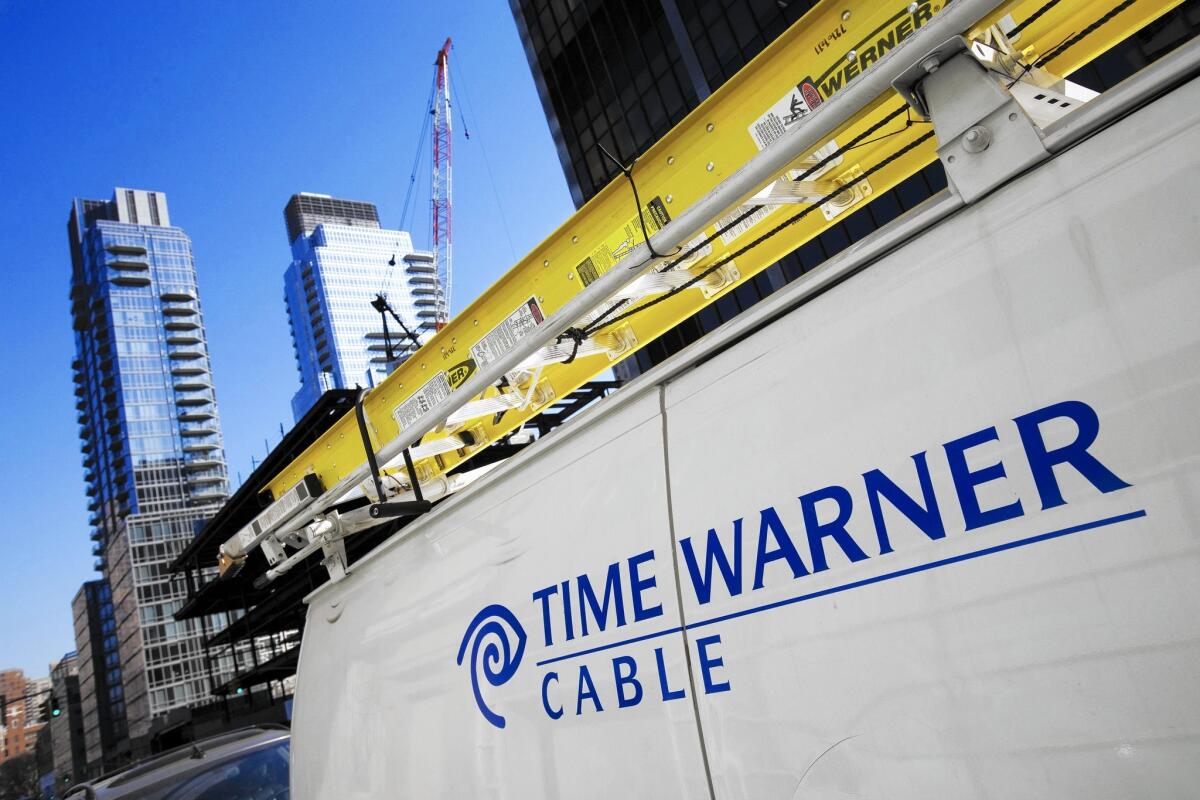Charter completes purchase of Time Warner Cable, Bright House

Charter Communications has completed its purchase of Time Warner Cable and Bright House Networks, a mammoth merger that sweeps together 25 million customers in 41 states and reorders the landscape for high-speed Internet and pay-TV service.
Charter, based in Stamford, Conn., intends to phase out the Time Warner Cable and Bright House names, and instead market its products and services under the Spectrum brand.
âCurrent Bright House Networks and Time Warner Cable customers wonât see many changes right away, though in the coming months they will begin to hear more from us about the Spectrum brand,â Charter Chief Executive Tom Rutledge said in a statement Wednesday morning.
SIGN UP for the free California Inc. business newsletter >>
Charter becomes the largest pay-TV provider in Southern California with more than 2 million customer homes.
The overall value of the cash and stock deal reached about $71 billion -- more than when the transaction was first announced in May 2015 because the value of Time Warner Cable and Bright House shares increased during the past 12 months.
Charter now is the nationâs second-largest broadband Internet provider, behind Comcast, and the third-largest pay-TV distributor behind AT&T and Comcast. Charter clinched the deal to buy Time Warner Cable a year ago, after Comcastâs bid for Time Warner Cable ran into a regulatory buzzsaw. Charter had been eyeing the Time Warner Cable assets long before that, and Wednesdayâs deal close marks the end of a more than two-year dance.
Charter is taking on $27 billion in debt to pull off the merger, buying out the shareholders of the larger Time Warner Cable and the smaller Bright House Networks.
Charter ended up paying about $60 billion for Time Warner Cable. It also assumes $21 billion in Time Warner Cable debt. Time Warner had more than 14 million customers.
Charter paid about $11.4 billion for Bright House, which serves more than 2 million customers, including in Bakersfield.
Many Time Warner Cable executives and technicians will remain with the company. However, most senior Time Warner Cable executives, including Time Warner Cable Chief Executive Robert Marcus, will depart this week.
Time Warner Cable shares are no longer publicly traded, closing Tuesdayâs session at $209.56 a share.
One area of concern for local Los Angeles Dodgers fans is whether Charter will be able to persuade other pay-TV providers in the area -- including AT&T, which owns DirecTV, Frontier Communications and Cox Communications -- to carry the SportsNet LA channel, which is owned by the Dodgers organization.
Time Warner Cable failed in its efforts to win wider carriage for the two-year-old Dodgers channel. Only Charter (and the former Time Warner Cable) offers the channel in its lineup.
Charter has not divulged its strategy for the Dodgers channel. That will likely come after Charter executives have had time to digest the deal, learn more about the systems it inherited in Los Angeles and gauge demand for the expensive sports channel.
The Connecticut company is not new to the LA market. Charter long has provided service in several Southern California regions, including parts of the San Gabriel Valley and Long Beach.
Liberty Broadbandâs stake in the company goes to 19%, and Liberty founder John Malone and Liberty Media Chief Executive Greg Maffei will continue to serve on Charterâs board. The Advance / Newhouse Partnership, which owned Bright House, will have a 13% stake in Charter and its board representatives will be Steve Miron and Michael Newhouse.
Unlike Frontierâs tumultuous takeover last month of Verizon wireline systems, including phone, Internet and FiOS TV service, Charter is swallowing two entire companies, and will have time to get familiar with its new systems before making dramatic changes.
The company eventually will switch its billing system and make other changes, but those roll-outs are expected to take more than a year.
Regulatory agencies approved the deal earlier this month. As part of the negotiations to win approval, Charter agreed to extend its cable lines and offer low-cost Internet service to poor families with children and low-income seniors.
The company also agreed to not thwart the development of video streaming services and to comply with Open Internet rules for three years.
MORE:
Robert Shapiro reveals to Megyn Kelly what O.J. whispered
Megyn Kelly goes too easy on Donald Trump in her Fox infomercial, er, special
Warner Bros. shuffles its DC film executive ranks after âBatman v Supermanâ criticism
Major Pandora investor pressures company to sell
More to Read
From the Oscars to the Emmys.
Get the Envelope newsletter for exclusive awards season coverage, behind-the-scenes stories from the Envelope podcast and columnist Glenn Whippâs must-read analysis.
You may occasionally receive promotional content from the Los Angeles Times.











